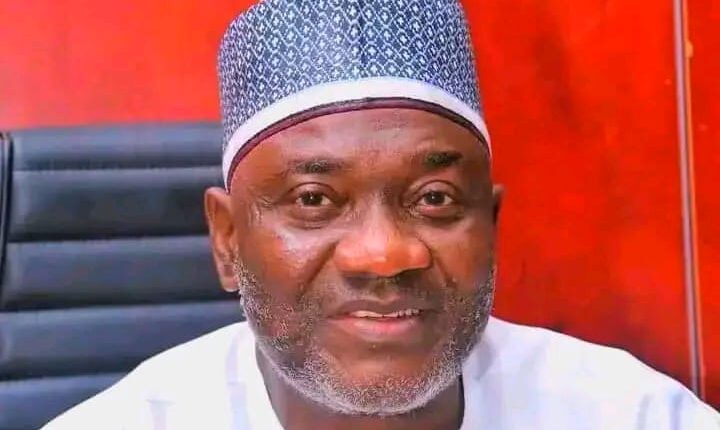Echocho: The Quiet Power Rebuilding Kogi East
A profile on Senator Jibrin Isah (Echocho) and why continuity in 2027 could be Kogi East’s biggest asset
By John Akubo
On a humid morning in Anyigba, young traders gather under the new solar streetlights, grateful for the glow that has extended their hours of business. A few kilometres away in Dekina, children stream into freshly built classrooms, clutching slates and notebooks. In Ibaji, the hum of a rice milling plant signals the dawn of agro-industrial growth.
In Idah, a newly equipped hospital treats patients with machines supplied only months ago.
Behind these quiet but visible shifts is Senator Jibrin Isah, known to his people simply as Echocho. To some, he is a banker-turned-politician. To others, a technocrat with a knack for numbers. But to Kogi East, he has become something bigger, a steady hand at the Senate, who has turned legislation into lived realities and politics into development.
Echocho’s rise is not accidental. Before politics, he was a respected banker, an economist who understood how policy could shape lives. Those skills followed him into the Red Chamber in 2019, where he quickly proved himself as more than a seat-warmer.
Unlike many lawmakers content with titles, Echocho has been prolific in bills and motions. His legislative record is wide-ranging; from health to education, from infrastructure to social justice. He sponsored the National Eye Centre Ochadamu (Establishment) Bill, the Federal University of Education Ankpa Bill, and the Nigeria Cashew Processing Agency Bill that speaks directly to the agro-based economy of his people. He has fought for road rehabilitation, rail connections, aquaculture projects, and aid for flood-ravaged communities.
“Every motion he raises carries the imprint of our struggles back home,” says Musa Audu, a youth leader in Dekina. “He speaks like someone who lives the daily life of his people.”
The true measure of a senator, however, is not only in the bills he drafts but in the bridges he builds between Abuja and home. Here, Echocho has excelled.
Since 2019, Kogi East has witnessed projects that cut across health, education, agriculture, and infrastructure:
Health: Over 30 primary health centres equipped across Idah, Ibaji, Ofu, Igalamela, Omala, Dekina, and Ankpa. A 20-bed hospital in Olamaboro. A cottage hospital in Dekina. Medical equipment delivered to zonal hospitals and training institutions.
Education: Construction of new school blocks in Ankpa, Dekina, and Anyigba. Rehabilitation of facilities at Prince Abubakar Audu University, including the university bakery.
Agriculture: Cassava processing factory in Ankpa, cashew processing centre in Ofu, rice mills in Omala and Ibaji — projects designed not just for food security but for job creation and industrial growth.
Water & Power: Dozens of solar-powered boreholes spread across nearly every LGA in Kogi East. Transformers installed in rural communities. Solar streetlights brightening dark towns.
Infrastructure: Roads built or rehabilitated in Dekina, Omala, Ankpa, and other parts of the district. A police area command office rising in Anyigba.
These are not abstract achievements. They are boreholes where villagers draw clean water. They are classrooms where children sit at desks instead of under trees. They are rice mills that buy from farmers who once watched their produce rot.
Nigeria’s National Assembly runs on seniority and influence. The longer a lawmaker stays, the more powerful his voice becomes in the allocation of projects and appointments. Echocho, now a ranking officer, has leveraged that capital to pull resources into Kogi East.
“Replacing him in 2027 would be like uprooting a tree just when it starts bearing fruit,” notes Dr. Ibrahim Yakubu, a political analyst in Lokoja. “He has crossed the learning curve. What Kogi East needs now is consolidation, not experimentation.”
Indeed, in Abuja, Echocho has carved a space not just as a senator from Kogi but as a national figure with the ear of committees that matter. He sits at the intersection where policy translates into budget lines, and budget lines into projects on the ground.
Unlike fiery politicians who thrive on headlines, Echocho is calm, methodical, even understated. His nickname, Echocho — which means “clarity” in Igala — reflects that measured approach. He rarely engages in noisy politics but lets his work speak.
This quiet style has earned him admirers and critics alike. Admirers see him as focused, results-driven, unwilling to be distracted by drama. Critics argue he could do more to sell his achievements loudly. But even they admit the results are visible.
“He is not the type that makes empty noise,” says Charity Odu, a women leader in Ankpa. “He makes things happen and moves on. That is leadership.”
Elections in Kogi East have often been coloured by clan rivalries, tribal sentiments, or political horse-trading. Echocho’s case challenges that pattern. His record is one of performance, not promises. He has shown that with persistence, the senatorial office can be more than a title — it can be a tool for transformation.
Looking ahead to 2027, the choice before Kogi East is not just about a candidate but about a legacy to protect. Echocho’s projects are seedlings that need nurturing. His influence is a ladder the region must climb higher. To throw that away in the name of sentiment would be to trade continuity for uncertainty.
As the sun sets on his second term, Echocho stands tall among the most impactful senators Kogi East has produced. He is not a man of slogans but of substance. His record in lawmaking, his investment in infrastructure, his attention to healthcare and education, and his push for agricultural industrialisation place him in a class of his own.
History will judge him kindly. But before then, the people of Kogi East must decide in 2027 whether to keep building on the foundation he has laid — or to start all over again.
For a region hungry for progress, the answer seems clear: Echocho is not just a senator; he is an opportunity Kogi East cannot afford to lose.

